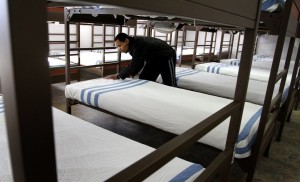 Finding a place to live will be difficult for some. For others, there will be no choice because of the Dept of Corrections’ requirements. Some may be mandated to a halfway house or required to return to the county where the crime was committed.
Finding a place to live will be difficult for some. For others, there will be no choice because of the Dept of Corrections’ requirements. Some may be mandated to a halfway house or required to return to the county where the crime was committed.
If you have no restrictions on where you live, think hard before deciding to move back into your old neighborhood. There may be people and activities there to pull you back into committing crimes.
Some will have a supportive friend, relative, or family member to live with and housing may not be a major concern, while others will need to explore different options.
When looking for housing, keep in mind where it is located relative to your work, what transportation is available, and what stores are in the area.
- United Way 2-1-1, formerly First Call for Help, is a service that can assist you in finding temporary shelter like the ones listed below. Resources are accessible to you through the library transition resource center, the Internet (after your release), and by dialing 211.
- Community Action Agencies provide services to reduce the effects of poverty in the community. Many provide energy assistance, winterization, housing, and emergency shelter services. These agencies are also a good source of information and referral for related
services. For agencies: http://www.gcaaonline.org/member_agencies.htm. - County Social Services Agencies administer low-income financial assistance programs such as the Georgia Family Investment Program (GFIP) and General Assistance, as well as other assistance programs such as Medical Assistance, Emergency Assistance, and Food Stamps. They may provide referrals for overnight shelter. There are strict state and federal guidelines for the above programs so immediate monetary assistance may not be possible.
- Drop-In Centers provide a variety of services, which may include food, clothing, and support. The centers serve as sources of information, and daytime shelter. Availability is limited to larger metro areas.
- Emergency and Overnight Shelters offer lodging for a short period of time (usually one or two nights) until other arrangements can be made through the county or other programs. You may use 2-1-1 (First Call for Help) to help locate these shelters. Metro-wide Engagement on Shelter & Housing (MESH) also offers a directory of shelters in the metro area that have immediate openings; call 1-888-234-1329 for this listing. There is no charge for staying at most emergency shelters. Some charity-sponsored shelters may require that you participate in their programs to use their shelter.
- Salvation Army Units—provide shelter vouchers to individuals in need. They may also help out with meals and other essential needs. http://www.salvationarmy.org/arc.htm
- Emergency & Information/Referral Phone Numbers: Governor’s Help Line : 24-hour service, live, trained counselors. Call for counseling,
information and referrals 1-800-338-6745. Task force for the Homeless : Call 1-800-448-0636 for information.
United Way’s First Call For Help : 24- hour service; call 211 - Adult Rehabilitation Centers – There are over 100 centers with high success rate in getting off the streets and into clean living facilities. They offer meals, medical checkups, AA programs, job skill training, & counseling. Many include similar programs for women. www.GeorgiaHousingSearch.org

